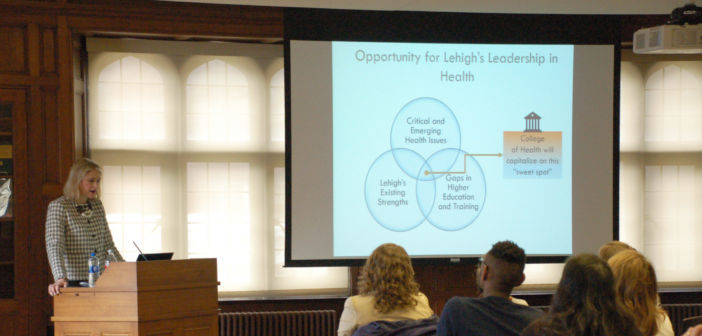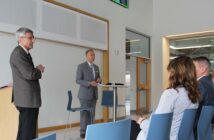Inaugural College of Health Dean Whitney Witt shared her working vision for Lehigh’s new College of Health in a forum on April 2 during National Public Health Week.
The college, which will be the second in the nation to offer students an undergraduate degree in population health, is set to open in the 2020-2021 academic year. A new health, science and technology building was recently approved by the board of trustees and the Bethlehem Building Commission, Witt said.
Witt stressed the need to focus on health, not health care. The biomedical model of medical training focuses mainly on health services and health outcomes.
Population health, which will be the main focus of the College of Health, is the science of understanding the multiple determinants of health, including biological and social. This allows researchers to describe the health of a population, explain causes of health outcomes and increase awareness and understanding for non-clinical factors relating to health outcomes.
Population health relies heavily on biomedical data science. As there is now an abundance of data on factors that produce health, the new college will not only focus on data analysis, but also data visualization, which allows for the clearer communication and better understanding of data.
“I really do appreciate the interdisciplinary approach (to) population health,” said Nick Ungson, ’19G. “One thing I’m most excited about is thinking about health not just at the individual level but in communities, groups of people…. How can we share this information with policy makers and the people who are making the real decisions?”
Witt outlined a faculty hiring plan. While no specific number was given to the total faculty or students the college would eventually have, Witt explained that a search is underway to recruit senior people who could bring grants from the National Institute of Health or other large health organizations.
From there, the college will begin hiring early and mid-career professionals. Witt seeks to provide training grants first at the undergraduate level and eventually at the graduate and postdoctoral level.
“This is a pathway to recruit top students who won’t have to pay for their training here,” Witt said.
The College of Health will start off modest in size, but at least six departments could be added as it grows. Only an undergraduate degree or certificate in population health will be offered initially. With time, however, the College of Health could offer a master’s or doctorate degree in population health or related disciplines.
“I’m very excited about (the College of Health),” said Nicole Defenbaugh, an adjunct professor in Lehigh’s health, medicine and society program. “I think [Witt] outlined very clearly what the goals are.”
The University of New Mexico is the only university in the country to offer an undergraduate degree in population health as of now.
Witt brings with her over 25 years of experience in both academia and industry. She was previously the director of the Center for Maternal and Child Health Research at IBM Watson Health in North Carolina.






Comment policy
Comments posted to The Brown and White website are reviewed by a moderator before being approved. Incendiary speech or harassing language, including comments targeted at individuals, may be deemed unacceptable and not published. Spam and other soliciting will also be declined.
The Brown and White also reserves the right to not publish entirely anonymous comments.
2 Comments
Never heard of Population health before: https://en.wikipedia.org/wiki/Population_health. Those who want Lehigh to continue down the liberal road should be happy if my cursory glance of wikipedia proves correct.
It seems to me that that thesis is that a cause of sickness is the fact that society doesn’t work so let’s try to identify and solve the existing problems of society. I would rather see a program that indicates how society works effectively, is that sociology/anthropology/religion. Apparently academia has not determined an effective way to produce a healthy society so we are going to try to cure the symptoms not the causes.
On a positive note, this will produce more jobs but unfortunately will either make government expand or health costs increase
Doesn’t Cheney University have a health program as well?